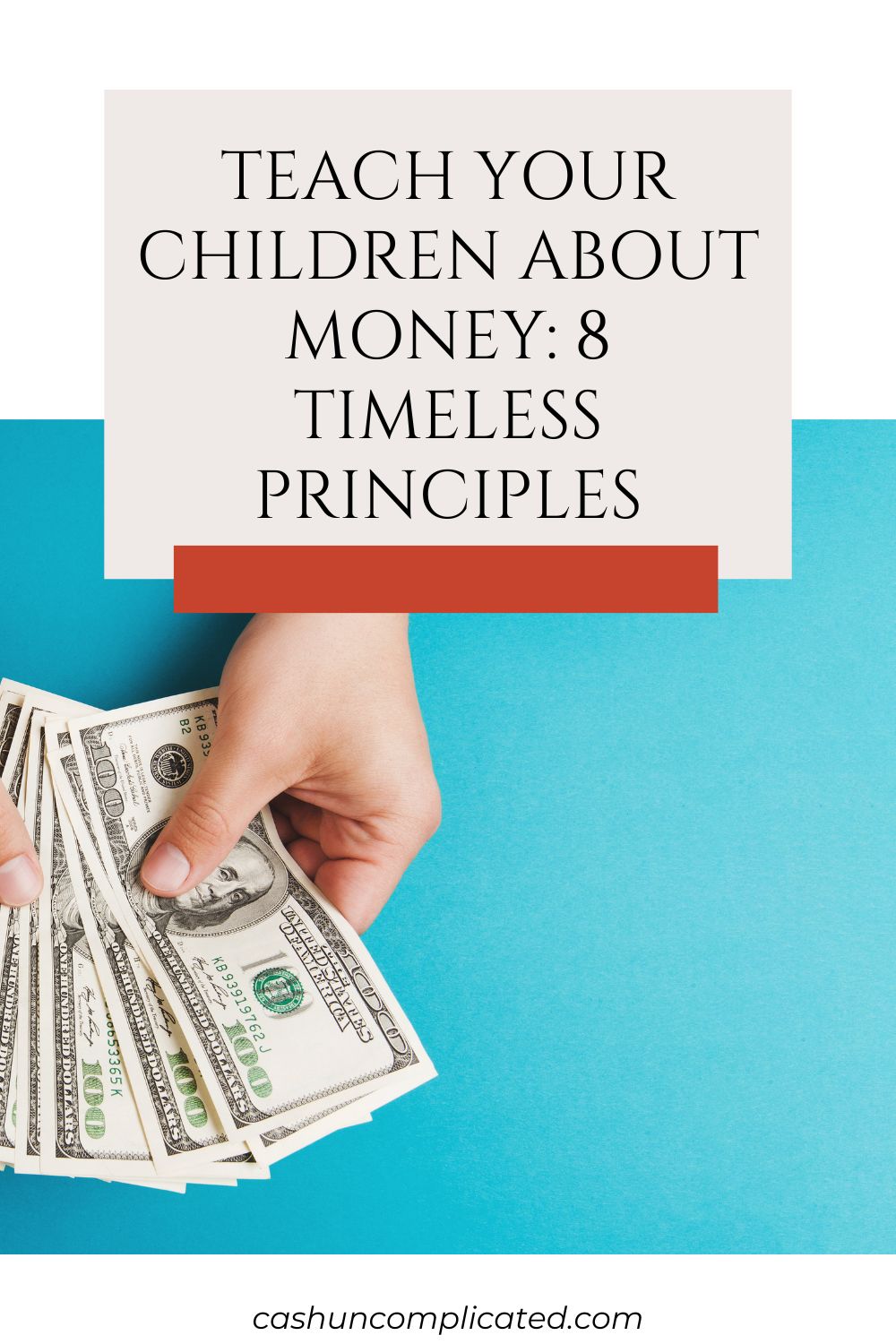You are the best person to teach your children about money. The majority of schools don’t teach kids about personal finance and the internet is full of bad information and influencers touting get rich quick schemes.
Much like health, wellness, and other life skills, personal finance is an important topic and needs to be addressed.
Why is it Important to Teach Your Children About Money?
Money isn’t the important thing in life but learning about it will make the important things much easier. Take these points:
- Learning to stay out of consumer debt will save years of unnecessary personal and relationship stress
- Effectively investing over a sustained period will create long-term wealth and financial security
- Paying yourself first and automating investments guarantees you’ll be investing every single month
Teaching your kids these simple ideas will make their life a lot easier. So why wouldn’t you want to teach them to set up their present and future?
Do Most People Teach Their Children About Money?
Money is an uncomfortable topic for many people for a host of reasons.
As a result, most people don’t teach their children about money. Teaching your kids about money will put them at an advantage against the great majority.
Are You Qualified?
You might be asking yourself if you’re even qualified to teach your children about money. Maybe you’ve made some financial mistakes in the past or continue to struggle with your own personal finances.
My argument is that you being a parent makes you qualified. You’re their parent and nobody cares more about your own kids than you do. That reason alone makes you qualified.
If you’ve made mistakes in the past or continue to make money mistakes, use that as part of your teaching. Your experiences make you qualified. The most powerful message a child can receive is from their parent.
Inspiration for You to Get Better
If you’re still not feeling qualified to teach your children about money, that’s great inspiration for you to learn more yourself and improve so you’re able to teach. If you’re just starting to learn about money yourself, try these books:
- The Richest Man in Babylon
- The Millionaire Next Door
- The Automatic Millionaire
- And my book Cash Uncomplicated
All of these books will give you plenty of material and confidence to start.
Do You Have to Teach Your Children About Money?
Of course nobody has to teach their children about money. But teaching them about money will give them a head start in life and massive advantages as they grow into adulthood. Think of it as an invaluable gift you are giving them.
What Age Should You Start Teaching Your Children About Money?
There’s not a set age to start teaching your children about money. Obviously you can’t teach a newborn or eight-month old about personal finances. Start looking for opportunities at an early age though.
For me, it was around age four that I started introducing little lessons here and there. Simple things like converting their change to dollar bills at the coin converter you see at the grocery store. Then going over how much each coin and dollar is worth.
There are plenty of other opportunities at an early age such as:
- Playing games like Junior Monopoly or Cashflow for Kids
- Showing your kids how much things cost
- Taking the time to answer money questions (which do come up at an early age)
Number 1: Make it Simple
Keep personal finance simple. Kids and adults learn best when things are broken into simple terms. Break down what you want to teach into its simplest terms.
For example, if you’re teaching your child about buying stocks, break it down into a simple idea like they are buying a very small ownership of that company. Don’t get into margin calls, shorting the market, or other advanced concepts.
Keep it simple and age appropriate so your child can really understand the ideas. Then get into some of the more advanced things when they’re ready.
Number 2: Keep it Age Appropriate
Meet your child where they are. For a child under four years old, you might just start with putting money into a piggy bank. Let them physically put the coins or dollars in so they can feel it.
Then when they are a little older, you might get into saving a little before spending on toys (principle of pay yourself first). A teenager can probably work with you to open their own bank account and learn about compound interest.
I have a separate little high yield savings account for both of my kids (ages four and seven) where they “invest” the first 30 cents of every dollar. I show them how the account grows just by putting the money there instead of in their piggy bank.
They both seem to enjoy watching their money “magically” turn into more money (compounding) just by them keeping the money in that account. As a side note, the inflation conversations will come when they are older. For now, it’s important to simplify how compounding works.
Number 3: Find Ways to Make It Fun and Interesting
Learning doesn’t have to be boring. In the book Finish: Give Yourself the Gift of Done, Jon Acuff writes that learning and growing can be fun. It doesn’t have to be a daily grind and slog.
Find some fun and interesting ways to teach your children about money. For example, with my two daughters, I wanted to show them a bank statement and how compound interest works. Rather than just show them the screen, I introduced the mini-lesson with some enthusiasm.
“Do you want to see a magic trick about how money can make more money?” I then showed them how the money they already put in to the account was growing more money. Even though they had only gained a few cents in interest, the magic trick actually worked because their money produced more money.
No work needed to be done and there was no effort put forth, the simple fact that the money was in the account made more money. This was both fun and interesting for the kids, even in the short amount of time we went over the statement.
Number 4: Help Them Understand How It Benefits Them
Teaching your children about money isn’t going to work if they don’t understand how it benefits them. They can understand all the concepts, but if they’re not connecting the dots on how it benefits them, it’s not helpful. Here are some examples:
- 8-year old: “Investing your money will make more money. That means your money can make more money than you doing work around the house.”
- 18-year old: “If you invest 30 percent (or whatever number you choose) of your money, you’ll always have plenty to live on.”
- 6-year old: “After you invest your money, you can use all the money you have leftover to buy whatever toy you have the money for.”
- 14-year old: “Save X amount of money every month and you’ll have plenty for a car when you’re 16.”
These are all simple ideas, yet powerful because they all provide a behavior (saving/investing) followed by an opportunity for a reward.
Number 5: Lead by Example
Tip number five to teach your children about money is maybe the most important. And that’s to lead by example. You can give the greatest lessons in the world, but if you’re not leading by example your children aren’t going to pay attention.
Your kids watch what you do more than listen to what you say. If you’re calm and collected about money and have free-flowing money conversations with your spouse, your kids will be watching.
Likewise, if you’re having loud arguments with your spouse, your kids are watching and learning that money is stressful and causes fights.
Some simple tips:
- Casually talk with your kids about personal finances as you’re going through them anyway
- When you review your investments, have your kid sit down next to you for a few minutes
- Talk with them about things like real estate, stocks, and compound interest as you think about them
Number 6: Play Games
Let’s start with the timeless classic here: Monopoly. Or Junior Monopoly for younger kids. There’s also Cashflow and Cashflow for Kids, among others.
Not only are these games fun, but they also teach a great amount. I can’t tell you how many conversations playing Junior Monopoly has led to with my daughters, such as:
- How buying a property and collecting rent pays you just for having the property
- Why property is better than hoarding cash
- How you can collect more rent by owning more property
Number 7: Take Advantage of Informal Opportunities
There are a lot of informal opportunities to teach your children about money. For example, every time my kids earn their commission by doing extra work like pulling weeds, they watch me deposit the money into their high-yield savings account.
My oldest daughter especially asks questions about what she can do with the “investment money.” She makes suggestions like help pay for college, buy a car, etc. I also take that teachable moment and add that she can use it to buy rental properties that pay her, or even life off when she’s older.
Take other opportunities like at the store when the kids want to buy a toy. I have no problem with them buying a toy, but it’s also important to have a conversation about whether they want to buy that toy now or use the money next weekend when we go to the zoo or somewhere else.
The result at this age doesn’t necessarily matter, but the thought process does. Thinking about how to spend money is an important skill that kids will use the rest of their lives.
Number 8: Never Stop Teaching
It’s important to never stop teaching. There are opportunities everywhere to give your kids life and money lessons. We as parents just have to find those opportunities and do the best we can.
Think about the abundance of opportunities in places like the grocery store, at home, on vacation, in the car, etc. Even something as simple as filling up the car with gas can turn into a teachable moment about finding the gas station with the best prices and quality.
Conclusion
It’s really important to teach your children about money. Here’s the thing: they are either going to learn from you or other places. Maybe your child is a genius and is going to ride her bike to the library and read 10 personal finance books cover to cover every summer.
More than likely though your kid is going to be influenced by Instagram and TikTok showing how you can have the best cars, clothes, and apartment before turning 21. Or watch the financial behavior of their friend’s parents who are living paycheck to paycheck while running up credit card bills.
The idea is not to control your child’s money, but to give them the tools and knowledge to make good money decisions they can use the rest of their lives.
What they do with it is ultimately their choice, but the odds are stacked in your favor that at least some of what you’re teaching is going to sink in.
What kind of lessons do you teach your children about money?










